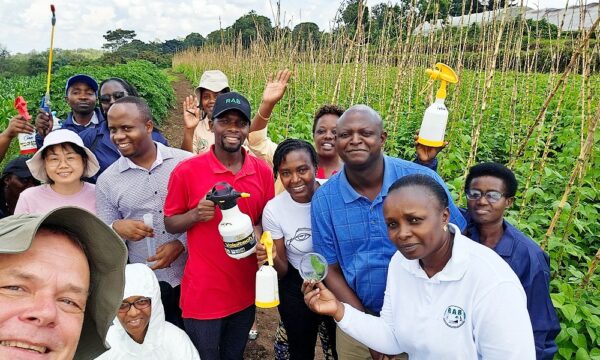
CABI promoted its new invasive species initiative at this year’s EcoSummit event which took place in Montpellier, France, from 29 August – 1 September. CABI’s latest initiative aims to tackle the issue of invasive species to improve the lives of 50 million farmers in Africa and Asia.
Launched in Copenhagen in 1996, the event provides a platform for ecological scientists and researchers from around the world to share new knowledge and discuss sustainable solutions to global environmental and ecological challenges. This year’s EcoSummit conference focused on terrestrial ecosystems, especially fragile systems that are less resilient to climate change and the impact that human activities are having on the environment – especially agriculture. The increasing global demand for food was also discussed and how intensified agriculture to meet this demand can adversely affect ecosystems.
CABI’s work on invasive species was highly relevant here as many invasive species cause the loss of natural biodiversity and alter global ecosystems. CABI’s expertise in tackling invasive species in order to promote environmental sustainability, livelihoods and food security is a significant contribution to solving global environmental challenges.
Julien Lamontagne-Godwin was one of CABI’s representatives at the conference. He said: “This conference is vital to showcase the myriad avenues of research in ecology, and is a vital tool to describe and remind us of the importance of a healthy ecosystem for our way of life. Many discussions we had with top scientists here highlighted the value of CABI’s knowledge platforms, such as our Invasive Species Compendium. These conversations also helped us add depth and significance to our new livelihoods initiative on invasive species.”
CABI has been working on invasive species for over 100 years, exploring measures to prevent, mitigate and manage invasive species on a global level. Through a selection of different sustainable techniques such as biological control, CABI tackles some of the worst invasive species that negatively impact terrestrial ecosystems and impact the livelihoods of farmers who depend directly on the ecosystem for their sustenance.
Related News & Blogs
Biological control in action: Zambia’s field days on fighting fall armyworm
Experts from CABI recently held two field days and an expo in Zambia, showcasing innovative approaches to pest management to 584 farmers, agro-dealers and other stakeholders to help raise awareness of approaches to tackle the invasive fall armyworm (Sp…
11 June 2025




